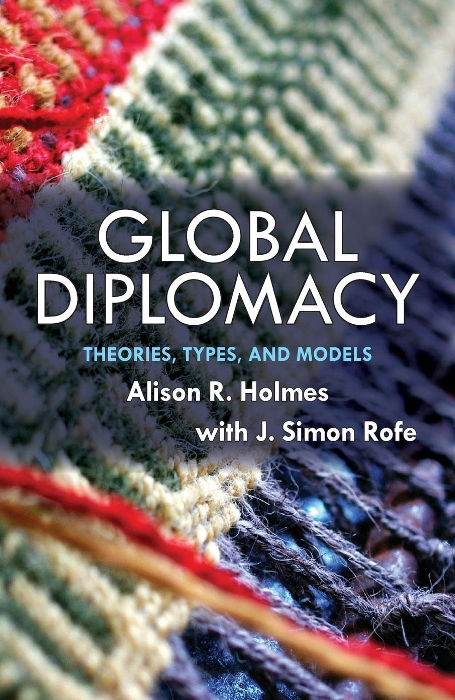Books
Alison Holmes
Global Diplomacy
Theories, Types, and Models
Alison Holmes’s Global Diplomacy: Theories, Types, and Models breaks new ground by moving beyond the traditional, Western-centric lens of diplomatic studies. In a rapidly globalizing world, Holmes invites readers to see diplomacy as a truly international institution—one shaped by diverse states, cultures, and historical experiences. This book is a vital resource for understanding not just how diplomacy has been practiced, but how it is evolving in response to new actors and global challenges. Holmes’s approach makes clear: the future of diplomacy is as varied and dynamic as the world itself.
Global Diplomacy offers a comprehensive introduction to the theory and practice of diplomacy, making it accessible to students and practitioners alike. The book begins with a concise overview of classic diplomatic narratives and theories, setting the stage for a broader discussion that includes non-Western states and those at various stages of development. Holmes, along with contributions from expert guest authors, explores four key types of diplomacy—political, cultural, economic, and military—demonstrating how each has evolved across different times and places. This thematic approach is enriched by case studies and historical examples, from the Treaty of Westphalia to the rise of modern multilateral institutions, offering readers a nuanced understanding of both continuity and change in diplomatic practice.
The book’s final section introduces three innovative models of diplomatic interaction: Community, Transatlantic, and Relational. These models are illustrated through contemporary examples such as the European Union, the shifting dynamics of UK-US relations, and the emergence of India and China as global powers. Holmes argues that these models help explain the complexity of today’s international system, where diplomacy is increasingly shaped by networks, regional organizations, and non-state actors. By analyzing both Western and non-Western experiences, Holmes provides a truly global perspective on how diplomacy is conducted and how it may continue to develop in the future
What distinguishes Global Diplomacy is its commitment to inclusivity and its forward-looking analysis. Holmes’s clear structure and accessible writing make complex theories and global case studies approachable for readers at all levels. The book’s integration of non-Western perspectives and its focus on emerging models of diplomatic practice ensure it remains relevant in a changing world. For students, scholars, and anyone interested in the future of international relations, Holmes’s work is an essential guide to understanding the evolving landscape of global diplomacy.

